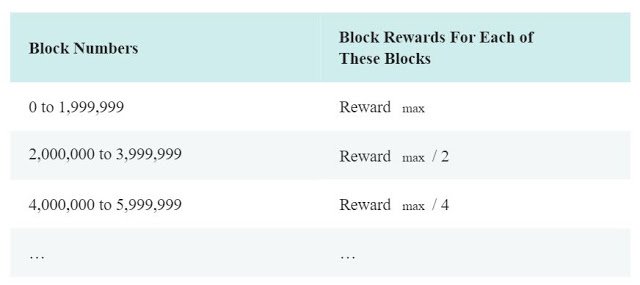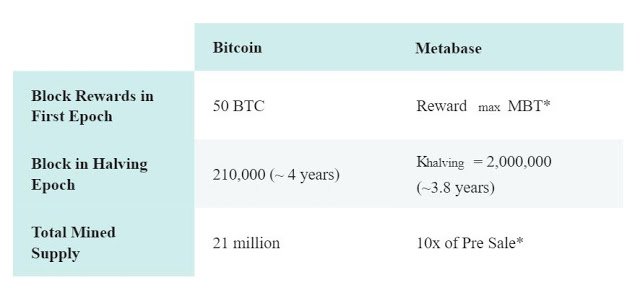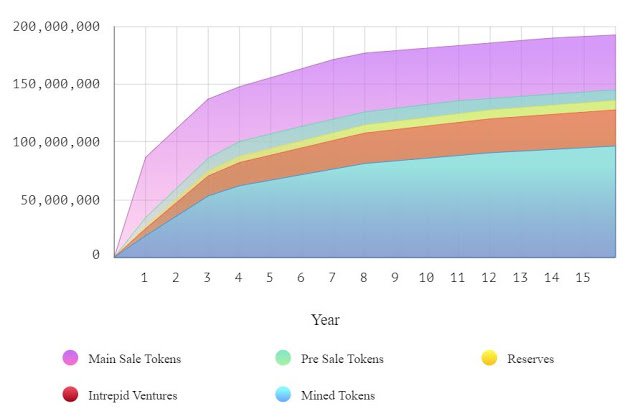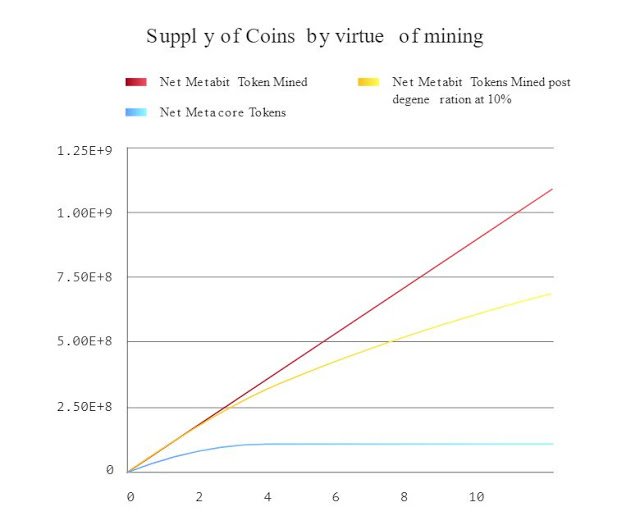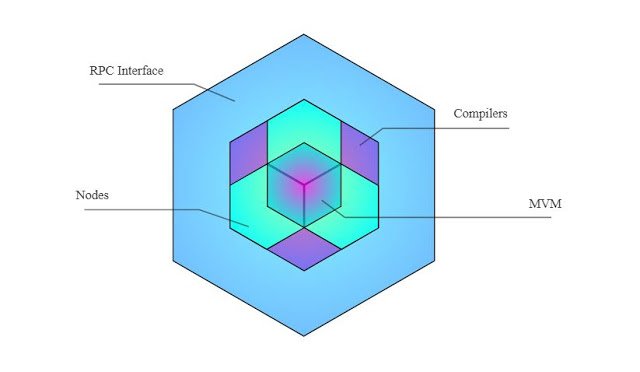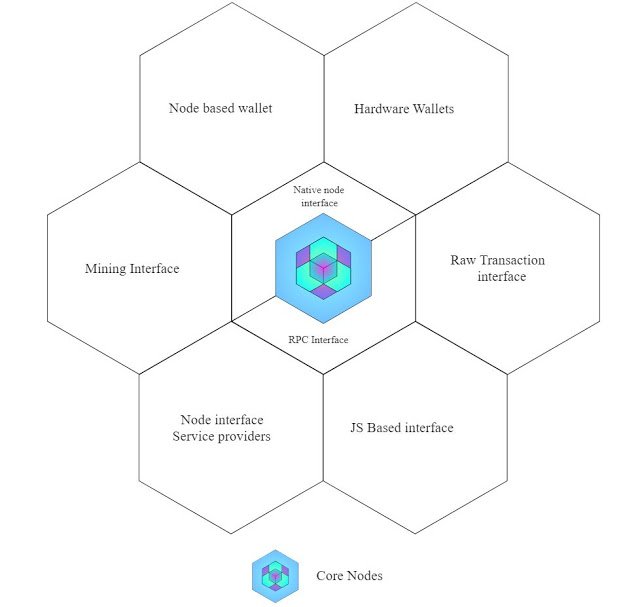Metabase build, scale, and monetize next-generation businesses platform
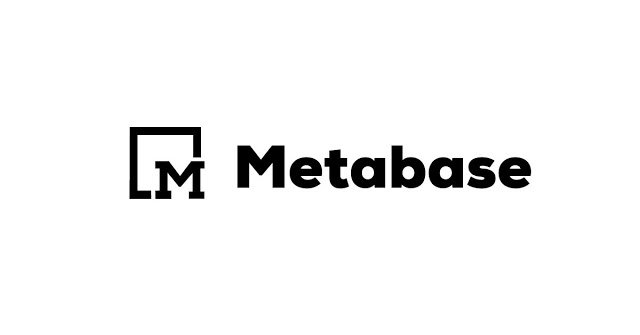
Metabase
Metabase is to build a blockchain platform to build, scale, and monetize next-generation businesses.
In this whitepaper, we describe the technical aspects of Metabase - providing technological solutions and innovations to overcome the challenges discussed above. As we mentioned the challenges of the first-generation blockchains, namely - Scalability, Limited Programming Ecosystem, Security and Usability and Governance. Here is an outline of how Metabase is planning to address these issues.
How it work ?
Scalability
In the Protocol section, we address scalability at a technical level by describing an innovative next-gen blockchain protocol that scales with adoption.
Limited Programming Ecosystem
A Virtual Machine 2.0 with an augmented OpCode Space - unleashing a rich programming ecosystem which enables programming on high-level programming languages for end users, low-level programming languages for organizations and identity systems within the core blockchain.
Security and Usability
In the Virtual Machine section, we describe how Metabase will incorporate standard security constructs into the OpCode space itself - reducing the burden of application programmers. An augmented OpCode space will also make blockchains easier to program.
Governance
A blockchain should be like a living specimen that evolves over time. Under the Governance section, we describe a framework to enable a controlled evolution of Metabase - with the process guided by open consensus of the participants. Governance of Metabase encompasses areas from Metabase Improvement Protocols to controlling base axioms of the system.
Hence, with these features, Metabase will overcome limitations of first-generation blockchains and enable programmers and entrepreneurs to build their blockchain based solutions on a rich, scalable, secure, easy-to-use and evolving platform.
Challenging Scalability
Currency and its purposes
A currency can act as a medium of exchange, a store of value or both. For example, in modern times, the US Dollar has acted as a medium of exchange for international trade. It has also acted as a store of value, especially for people in volatile economies. Before the advent of paper currency, gold and silver coins acted as a ‘store of value’ while less precious metals like tin and copper coins provided for ‘medium of exchange’ coins.
Bitcoin’s woes
The economic dilemma of a cryptocurrency is best articulated by Bitcoin’s tricky situation. For it to be useful as a store of value - its demand and adoption should keep rising. This along with its deflationary nature will ensure Bitcoin keeps rising in value (vis-a-vis other currencies like USD). However, this has a double negative impact on its purpose as a medium of exchange.
Metabase and Challenging Scalability
Impact I needs redressal at an economic policy level - for Metabase, we address this in the Monetary Policy section.
Impact II requires addressing the technical issue of scalability or transaction throughput. In the Protocol section, we introduce how Metabase throughput would scale with increasing adoption to provide stable transaction fees.
Metacore - Store Of Value
Metacore Tokens Issuance - as Block Rewards.
Block reward per block for the first 2 Million Blocks are fixed at a constant denoted by Reward(max)
Block reward per block halves after every 2 Million Blocks, hence block rewards for different block numbers look as follows:
Each duration where the block reward is constant is referred to as a ‘Halving Epoch’The duration of a ‘Halving Epoch’ is denoted by khalving = 2 Million Blocks
Reward(max) will be a constant value determined by token issuance in Pre Sale (refer Token Sale Economics document for a sample calculation).
Token Distribution and Supply Over Time
Metabit - Medium Of Exchange
Metabit is the Medium of Exchange currency of Metabase. It is the transactional token of Metabase and will be used to denominate transaction fees. Metabit as a currency is inflationary in supply with a degree of demurrage associated which can be governed by the governance framework.
Based on supply of Metabit and Metacore, there is a rate of exchange derived between both tokens. All transactions of Metabase have a static transaction cost in terms of Metabit, but when the rate of exchange is applied, the overall transaction cost is reducing in nature with respect to Metacore.
Tools
Metabase system will embrace both browser and mobile platforms as first-class citizens and aims to encourage and support developers in search of easy-to-use blockchain applications on Metabase blockchain. This way Metabase aims to kickstart the second wave of innovation on blockchain which will be very similar to the advances in web services that followed the browser revolution.
Metabase core implementation will consist of Metabase Virtual Machine (MVM), the Metabase client (P2P, Consensus), Metabase Compiler and finally the interfaces that enable interactions with Metabase.
Metabase Mobile Light Client
Metabase will launch with a Light Client for mobile platforms, a type of blockchain client that does not need to download the entire blockchain to work. This way Metabase users will start using official mobile wallets right away instead of relying on third-party software. Besides wallet functionality and if the end-user so requires, Metabase Light Client will be able to store and process necessary KYC and identity information securely. This piece of information may be used for authentication in various types of interactions like trading in exchanges or sharing invoice details, therefore, embedding Metabase more and more into real life interactions.
Metabase Browser Extension
Metabase will be launched on modern browser platforms via a browser extension similar to Metamask. Metabase browser extension will enable users to interact with the next generation of products and services safely and securely right from their browser without downloading the entire blockchain.
Metabase Developer SDK and Integrated Development Environment
Developers will be able to create and deploy new products to Metabase blockchain directly by using the browser plugin and IDE. In terms of functionality, Metabase IDE will not be limited to compiling and deploying smart contracts but will play a critical role during development and guide developers to use best security practices at every step.
Roadmap
Phase 1
Project Conceptualisation (July 2017)
Identifying Pain Points (August 2017)
Research Validation (September 2017 - October 2017)
Phase 2
Drafting Whitepaper (November 2017 - January 2018)
Defining Sale Terms and Conditions (January 2018)
Pre Sale (June 5-22, 2018)
Main Sale (July 10 - August 7, 2018)
Phase 3
Core Node Development (May 2018 - October 2018)
Development of initial architecture
P2P communication and consensus mechanism
Light Client development
Deploying Testnet (October 2018)
MVM Development (November 2018 - March 2019)
Smart Contract Language and Compiler
Virtual Machine
Tools Development (January 2019 - May 2019)
SDK and IDE
Light Client
Browser Extension
Phase 4
Testing Networks (May 2019 - August 2019)
Going Live (September 2019)
More info, visit :
Website : https://metabase.network/
Whitepaper : https://whitepaper.metabase.network/
ANN Thread : https://bitcointalk.org/index.php?topic=3402629.0
Telegram : https://t.me/metabasenetwork
Facebook : https://www.facebook.com/metabasenetwork
Twitter : https://twitter.com/iv_metabase
Author : Anzal RK
My Bitcointalk : https://bitcointalk.org/index.php?action=profile;u=1115678
ETH : 0x7b56837589A428A507aB76b0Df46BfE7D2fa5C38
